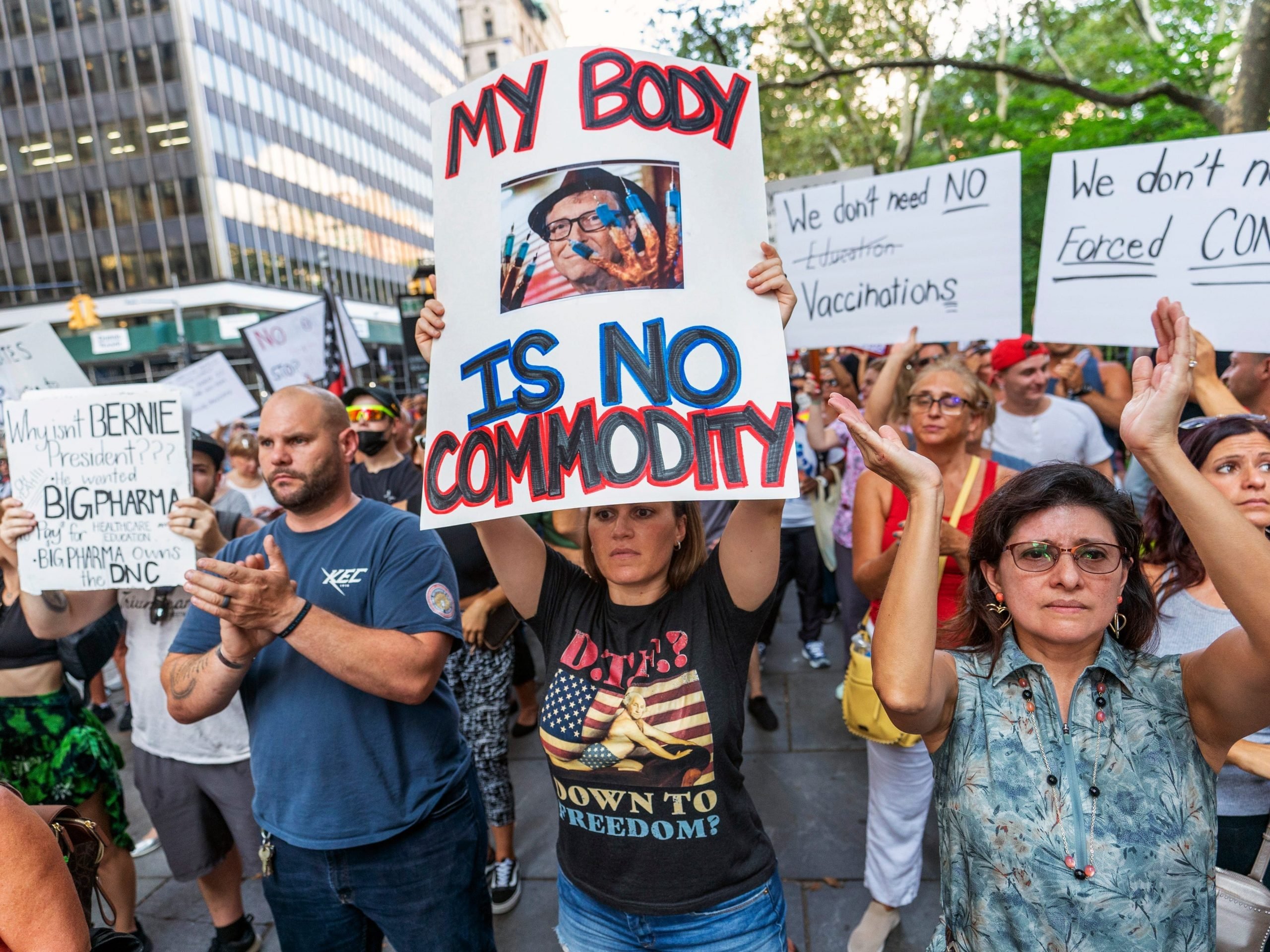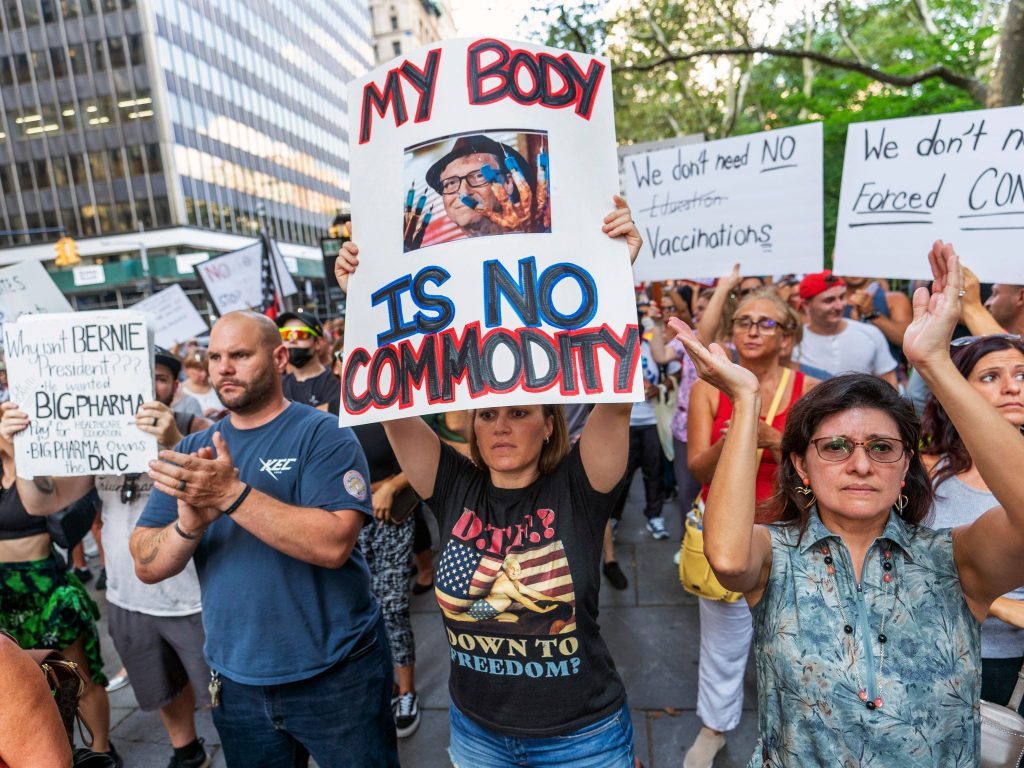
Mary Altaffer/AP Photo
- Like many, I've made the mistake of approaching vaccination as a moral issue rather than an identity issue.
- Moralizing the vaccine is a great way to feel like we're right, but it's a terrible public health strategy.
- A better way to approach the unvaccinated is by understanding where they are coming from.
- Kelli María Korducki is a journalist, author, and contributing opinion writer for Insider.
- This is an opinion column. The thoughts expressed are those of the author.
- See more stories on Insider's business page.
The other day, I had an unexpected revelation from a cringey viral tweet courtesy of Occupy Democrats, a liberal political social media outlet. It detailed a Chicago judge's decision to revoke a divorced mom's custody of her 11-year-old child because, as it turned out, the mom was unvaccinated. The tweet's kicker: "RT IF YOU SUPPORT THE JUDGE'S DECISION TO PUT THE CHILD'S SAFETY BEFORE HER MOM'S DANGEROUS IGNORANCE!"
In fewer than 50 words, the tweet sketched an inadvertent caricature of how the mainstream, pro-vaccine discourse has sabotaged its purported cause – getting more vaccine doses into more people's arms. With ghoulish moralism, we've dug in our heels without noticing how handily we've shat the bed.
I say "we" because I, as a vaccine-loving moralizer and finger-wagger, am definitely part of the problem. I'm as guilty as anyone of "well actually" subtweets and puffed-chest smack-talk against the imagined hordes of unvaccinated crystal-lickers. Like so many others in the pro-vaccine camp, I've made the mistake of approaching vaccination like a moral equation. Instead, we need to accept that anti-vax fervor has become a totem of people's identity.
Anti-vaccine stances are a matter of identity
I recoil a bit as I recall the message I recently sent an old friend in response to something they'd posted on Instagram. My friend, an American expat in a country with higher vaccination compliance than the US, has spent much of the past year railing prolifically against lockdown measures and mask mandates on social media. Lately, they've trained their crosshairs on vaccine passports and the use of coercive tactics – social, rhetorical, logistical – to pressure unwilling parties into vaccinating against COVID-19.
My friend is not a conspiracy theorist. They're not even against vaccination, per se. In fact, this person doesn't fit the popular anti-vax stereotype of a meme-chasing, political conservative. Rather, they are an ardent longtime socialist with a degree from an elite private American college, blazingly intelligent, passionate, and well-read. Their stance on COVID-19 vaccination mandates and other state-imposed pandemic protocols isn't the product of selfishness or some unique susceptibility to misinformation but, rather, an extension of their ideologically-constructed understanding of how the world works, and how they fit within it.
It's better to understand why people have come to different conclusions
It's easy to see anti-vax belief as the byproduct of individual people's shortcomings. Whether we chalk up their decision-making to first-world exceptionalism, institutional paranoia, or willful ignorance, this line of thinking absolves us - and our elected officials - of the onus to build bridges or, heaven forbid, to come up with a plan 'B' in the event that all our shaming doesn't send the naysayers running to roll up their sleeves. It's a fine framework for feeling like we're right, but as a public health strategy, it stinks.
It's self-serving, too. When we choose to see anti-vaxxers as the victims of their own faulty logic, those of us who are vaccinated get to see ourselves, by extension, as altruistic critical thinkers. I'm sorry, but we're not. Most of us just want our lives back, and we're happy to take the path of least resistance to get there. It should come as no surprise that in our fragmented, deeply unequal and profoundly alienated society, others' paths will follow a different route. People live under vastly different material circumstances, within totally disconnected social milieus. We would be wise to try understanding why and how this is the case, instead of anointing ourselves the superior actors.
We must also understand that the unvaccinated aren't a monolithic population. Access and information gaps have persisted throughout the vaccine's rollout. And, as shown by the gentle uptick in COVID-19 vaccination rates following the recent FDA approval of the Pfizer mRNA shot, vaccine hesitancy is sometimes a temporary stopover amid bigger picture considerations around medical trust and access - considerations that are neither unfounded nor unfair.
As for the strident and loud anti-vaxxers - the people whose stance on vaccination launches street protests and threatens to rip apart close interpersonal relationships - they're not a monolith, either. Some are New Age-y natural medicine aficionados; others are religious fundamentalists; others buy into the notion that the vaccine is a government ploy to inject microchips into the muscle tissue of the state's unruly subjects.
But through Reddit boards, podcast interviews, and my friend's own digital output, I found some common threads. People are skeptical and disillusioned. Many are socially isolated and struggling. Whatever the story, they've found themselves at the fringes of our neoliberal, democratic society. They're on the outside, looking in and saying, "Y'know what? That'll be a no for me."
One article, published in March by the medical journal, The Lancet, likened the anti-vax movement to a cult.
"The pejorative label and negative attitudes towards cults promote an us-and-them viewpoint," the article's authors wrote. The result: martyrs for the cause who become all the more radicalized in their non-conformist system of belief, which itself becomes a beacon of honor.
"Learning from these consequences, a more constructive perspective could view the anti-vax movement as a religious phenomenon, involving a whole spectrum of ideas, and focus on the essential need to understand the beliefs that are involved to avoid further marginalization," conclude the authors.
Back to my friend, and the message I sent just a couple weeks back. I wrote that, while I hate all the moralizing, I believe in vaccine mandates as a strategy for striking the balance between personal liberty and the public good. That, despite our disagreement, their perspectives had expanded my thinking. When I checked back last week to see if they'd responded, I saw that I'd been blocked.
